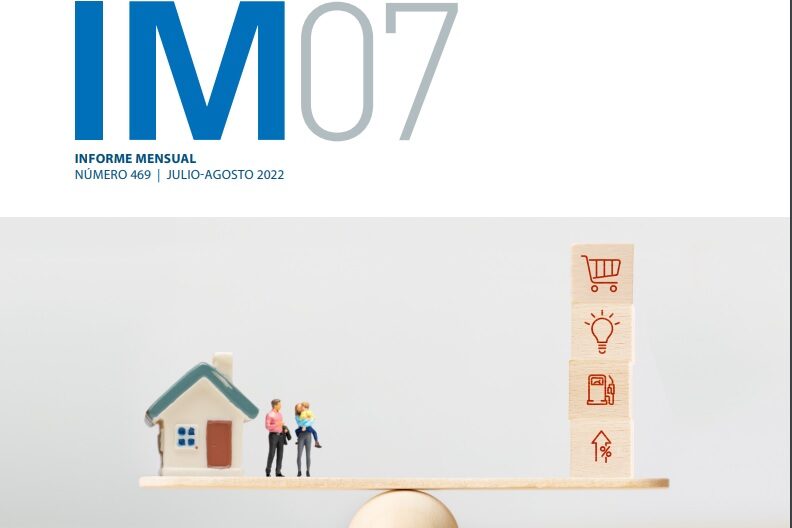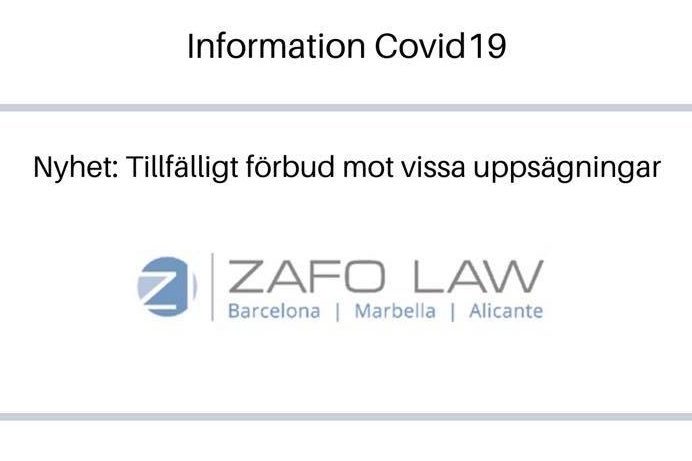19-03-2020
Följande artikel är skriven av Lexidy Law Boutique, artikeln är skriven på engelska:

STATE OF ALARM IN SPAIN: LEGAL CONSEQUENCES FOR COMPANIES
On March 17, the Government approved a second Royal-Decree 8/2020, 17 march 2020 on extraordinary urgent measures to address the economic and social impact of covid-19.
In this article we will analyse the labour related measures for companies and self-employed that have been approved in face of the health crisis, among which we will find the economic measures that the Government has taken to address the COVID-19 crisis
1. LABOUR-RELATED MEASURES FOR COMPANIES
The Government’s aim is to ensure that employers do not dismiss workers on the grounds that it is a “temporary crisis”.
For this purpose, Government will streamline the Temporary Employment Regulation Procedures (ERTEs). ERTEs are a way for companies to “freeze” employment contracts, without firing employees.
As soon as the situation returns to normal in the future, companies will be able to reactivate employees’ contracts at their previous levels. In the meantime, employees receive employment benefits, which are based on the salary they received under their contract.
1.1. WHAT REASONS CAN JUSTIFY THE USE OF ERTE ?
Spanish companies can implement ERTE for one of the following causes :
(i) Force majeure ;
(ii) economical, technical, organizational and productive causes;
1.1.1. Force majeure
- Causes: Pursuant to The Royal Decree-Law 8/2020, 17 March 2020, is considered as force majeure cause : the loss of activity as a result of Covid-19 and the state of alarm, involving the suspension or cancellation of activities, closure of premises with a public influx, restrictions on the transport and mobility of people and/or goods, lack of supplies that prevent the activity from continuing, or in urgent and extraordinary situations due to staff contagion or the adoption of preventive isolation measures.
- Procedure:
- The Company must file an ERTE application to be sent to to the competent Labour Authority for each employee affected by the measure. The application must be accompanied with the explanation of the direct correlation between the ERTE to be implemented and the State of Alarm. In the meantime, the Company must also inform the employees and the workers’ representative of the ERTE procedure activated.
- Upon receipt of the application, the Labour Authority must resolve it within five days.
1.1.2. Economical, technical production or technical causes
- Causes : If Companies cannot justify the ERTE measures based on force majeure causes, they must implement it for economical, technical, organizational and production causes.
- Procedure :
- This procedure starts with the consultation of the employee’s representatives of directly with the employees if any. The consultation shall not exceed the maximum period of seven days.
- The Company must file an ERTE application to be sent to the competent Labour Authority for each employee affected by the measure. The application must be accompanied with all pertinent documentation.
- Upon receipt of the application, the Labour Authority must resolve it within seven days.
1.2. WHAT TYPE OF ERTE MEASURES CAN BE IMPLEMENTED?
1.2.1. Suspension of employment agreement
If a company is experiencing serious temporary difficulties, the company may suspend the employment contract of its employees, regardless of the number of employees affected by the measure.
1.2.2. Reduction of working hours
If you experience a downturn in activity but not enough to suspend the contract of your employees, it is will be possible to only reduce the number of hours worked.
1.3 HOW ERTE CAN HELP MY COMPANY?
1.3.1 Salaries
Suspension of employment agreements:
- the company will be entitled to stop paying salaries to the employees affected by the measure.
- In the meantime, the employees will be able to receive the unemployment benefit, calculated from the Social Security contribution base of the last 180 days (this information is contained in the pay slip monthly issued, in the box “Base de cotización Seugridad Social”). Once this base identified, employees will be entitled to receive 70 % of this amount for the following 180 days and then 50 % of this amount until the end of the ERTE, subject to the following limitations:
Reduction of working hours
- the salary is reduced in the same proportion as the day is reduced. Will also be reduced, in the same proportion, any type of extra payment. However, the calculation of holidays is not affected.
1.2.2. Social Security Contributions
As long as the ERTE is in force, employees affected by ERTE will continue to be registered with Social Security. They could not be deregistered unless the company decides to terminate the employment agreement and consequently put an end of the ERTE measures.
Under normal circumstances and given that the employees are still registered with Social Security, companies implementing ERTEs should continue to pay Social Security contributions. However, pursuant to the Real Decreto-ley 8/2020, de 17 de marzo de 2020, companies implementing ERTE due to the coronavirus situation, will be totally or partially exempted from paying Social Security Contributions with no consequences to the employee’s rights to have access to the Public Healthcare in the following conditions :
- For companies with less than 50 employees: exoneration of 100%;
- For companies with 50 or more employees: exoneration of 75%;
- Such exemptions are conditional upon the Company maintaining employment levels in the 6 months following the re-activation of normal activity.
2. LABOUR-RELATED MEASURES FOR SELF-EMPLOYED (“AÚTONOMO“)
2.1. Promotion of ERTEs and exemption from social security charges
- The Self-Employed are entitled to file ERTEs under the following conditions:
- they have been forced to suspend their activity or;
- their activity decreased by 75% compared to the activity of the last semester (last 6 months).
- If they fulfilled the abovementioned conditions. they will be entitled to file an ERTE following the same procedure as the companies.
2.2. Consequences of ERTEs for Self-Employed
- When filed an ERTE, Self-Employed:
(i) will be able to receive Unemployment benefits.
(ii) will be fully exempt from paying Social Security Contributions.
- In addition, the Generalitat de Catalunya has approved a subsidy of up to 2,000 euros for:
- any Self-Employed domiciled in Catalonia,
- who are suffering economical loss, calculated by comparing this year’s income with that of the previous year (or with the average monthly income of those who have been self-employed for less than a year)?

For any further information or questions regarding tax, financial or corporate aspects, please do not hesitate to contact Lexidy Law Boutique:
Camila Brodersen
Head of Corporate Department
camila.brodersen@lexidy.es
Damien Marquet
Head of Corporate and Labour Department
damien.marquet@lexidy.es



